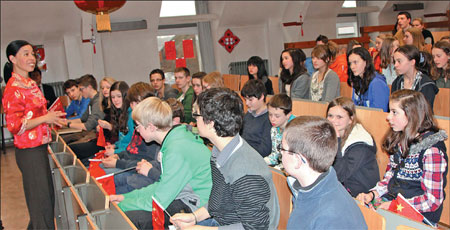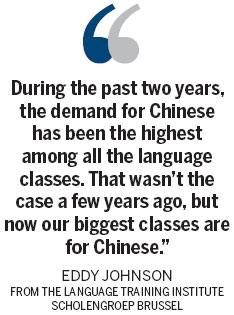A new word order
Updated: 2013-03-29 08:33
By Tuo Yannan (China Daily)
|
|||||||||||
|
Chen Hsiu-yin teaching Chinese at the French-speaking Institut de la Providence de Champion. Liu Ge / for China Daily |
Increasing demand for Chinese classes stems from surge in Sino-EU trade relationship
Instead of entering a university after his graduation from high school next year, Kieran-Jack Costello will travel to China alone and spend a year exploring the world's most-populous country.
From the perspective of a Chinese family, his decision would be considered wild or crazy, but instead, the 17-year-old who lives in Belgium has the full support of family and friends. Some admit they envy him.
"My school hasn't introduced Chinese classes yet, but we have French, German, Dutch and Japanese," says Kieran-Jack, who spends three hours a week learning Chinese in his spare time to prepare for his adventure.
"I think going to China for a year is a very good opportunity before university. I'm excited about putting my Chinese into practice!"
Kieran-Jack's strongest supporter has been his father, Nicholas Costello, deputy head of a unit at the European Commission's department for employment and social affairs. That's hardly surprising, because Costello senior was posted to Beijing several years ago and speaks Mandarin well. He believes his son's generation will benefit from the ever-closer ties between Europe and China.
"China has become much more connected with the world economically and is now the EU's second-biggest trading partner, so speaking English and Chinese in the 21st century will be a very big advantage," he says. "It's not only the language, but also knowing the culture, especially acknowledging and accepting the differences, that's the most important thing".
Costello's family isn't unusual, even though Kieran-Jack's background - Brussles-based, with a father from the UK and mother from Africa - is almost a template of diversity.
The number of people enthusiastically learning all they can about China is increasing dramatically in Europe, especially in light of the country's increasing influence on the global economy.
Europe has often repeated its commitment to open trade relations with China, most notably in the increasing efforts across the EU to improve communication with the country. One of the most striking changes of recent years is the number of officials and employees who have started learning Chinese.
"The main purpose of providing Chinese classes for EU employees and officers is that we want to promote the relationship between China and the European Union, commercially and culturally," says Anna Varna of the European Commission's human resources and security department.
The increasing demand for Chinese classes is associated with the surge in Sino-EU trade relationship, says Varna. China is the EU's second-largest trading partner, after the United States, and the EU is China's biggest trading partner.
In 2012, EU investment in China reached more than $6 billion, while $3.4 billion went from China into the EU, according to official data.
Rising demand
"During the past two years, the demand for Chinese has been the highest among all the language classes. That wasn't the case a few years ago, but now our biggest classes are for Chinese," said Eddy Johnson from the language training institute Scholengroep Brussel.
For many years, French, Russian and Spanish were the most popular courses among European Union and Commission staff, but as Johnson notes, Chinese and Arabic are now the languages of choice.
The Chinese class has about 60 students at different levels of proficiency, and the reasons for joining vary. One of the students, Demur Gaspard, who works for the European Commission, is learning Chinese to help him at work. "I deal mainly with Chinese affairs, so I'm learning the language for professional reasons," he says.
Apart from work-related reasons, many officials are learning Chinese for their own enjoyment. Tami Julien, director-general of development and cooperation at the European Commission, says his work mainly involves African issues, so for him learning Chinese is more about personal enjoyment.
One European Commission translator, who wanted to be known simply as Victor, has worked for international organizations for 25 years. He speaks fluent Spanish, Italian, English and French and is now learning Chinese: "I think Chinese is a very important language. I'm interested in learning about the country's culture and language. Also it's my obligation to stay up to date."
Many EU officials have hired Chinese-speaking assistants to better connect with the country. Pawel Bienkowski, a 26-year-old assistant to Wojciech Olejniczak, a Polish member of the European Parliament, enjoys greeting Chinese reporters in fluent Mandarin, while Victor Bostinaru, a member of the European Parliament and vice-chairman of the delegation for relations with China, has hired a Chinese assistant ahead of a trip to the country next month.
However, EU employees are not the only ones learning Chinese, and the implementation of language classes is one of the hottest topics among school boards and parents in many European schools.
"Three years ago, only three schools in the French-speaking areas of Belgium taught Chinese. Now the number has climbed to more than 30. In the Dutch-speaking areas, it used to be four, but now 19 universities and schools have set up Chinese language courses," explains Wang Luxin, counsellor to the education department of the Chinese embassy in Belgium.
Today's Top News
List of approved GM food clarified
ID checks for express deliveries in Guangdong
Govt to expand elderly care
University asks freshmen to sign suicide disclaimer
Tibet gears up for new climbing season
Media asked to promote Sino-Indian ties
Shots fired at Washington Navy Yard
Minimum growth rate set at 7%
Hot Topics
Lunar probe , China growth forecasts, Emission rules get tougher, China seen through 'colored lens', International board,
Editor's Picks

|

|

|

|

|

|







